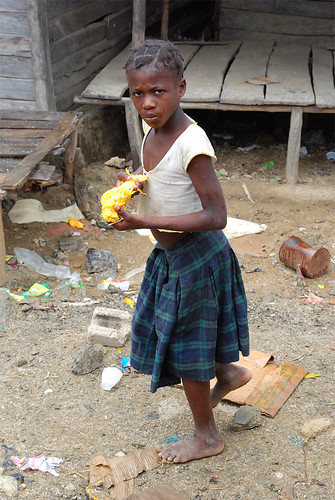UPDATE 1/14: This post was linked in a story by Discovery News’ James Williams.
Haiti and the Dominican Republic share the island of Hispaniola. Following the island’s discovery by Columbus in 1492, Spanish colonialists exterminated the island’s indigenous Arawak Indians. In 1697, the French took control of what is now Haiti and instituted an exceptionally cruel system of African plantation slavery. In the late 1700s, the half million slaves revolted. In what is the only successful slave revolution in history, they ousted the French and established the first Black republic in the Western Hemisphere.

Haiti’s population of over eight million people occupies a territory somewhat smaller than the state of Maryland in the United States. The land is rugged, hilly or mountainous. More than 90 percent of the forests have been cleared. Haiti is the poorest country in the Western Hemisphere. Extreme inequality exists between the urban elite, who live in the capital city of Port-au-Prince, and everyone else.
The people in the countryside are the peyizan yo (the plural form of peyizan), a Creole term for small farmers who produce for their own use and for the market (Smith 2001). Many also participate in small-scale marketing. Most peyizan yo in Haiti own their land. They grow vegetables, fruits (especially mangoes), sugarcane, rice and corn.
Accurate health statistics are not available, but even rough estimates show that Haiti has the highest prevalence of HIV/AIDS of any country in the region. Medical anthropologist Paul Farmer emphasizes the role of colonialism in the past and global structural inequalities now in causing these high rates (1992).
Colonial plantation owners grew fabulously rich from this island. It produced more wealth for France than all of France’s other colonies combined and more than the 13 colonies in North America produced for Britain. Why is Haiti so poor now?
Colonialism launched environmental degradation by clearing forests. After the revolution, the new citizens carried with them the traumatic history of slavery. Now, neocolonialism and globalization are leaving new scars. For decades, the United States has played, and still plays, a powerful role in supporting conservative political regimes.
In contrast to these structural explanations, some people point to problems with the Haitian people: They cannot work together, and they lack a vision of the future.
Opposed to these views are the findings of Jennie Smith’s ethnographic research in southwestern Haiti, which shed light on the life of the peyizan yo and offer perspectives on their development (2001). She found many active social organizations with functions such as labor sharing, to help each member get his or her field planted on time, and cost sharing, to help pay for health care or funerals. Also, the peyizan yo have clear opinions about their vision for the future, including hopes for relative economic equality, political leaders with a sense of social service, respe (respect), and access of citizens to basic social services.
The early colonizers did not decide to occupy Haiti because it was poor. It was colonialism and its extractive ways that have made Haiti poor today.
Sources:
“Culturama: The Peyizan Yo of Haiti,” in Barbara D Miller, Cultural Anthropology, 5th edition, Pearson. 2009, p. 404.
Smith, Jennie M. 2001. When the Hands Are Many: Community Organization and Change in Rural Haiti. Ithaca, NY: Cornell University Press.
Farmer, Paul, 1992. AIDS and Accusation: Haiti and the Geography of Blame.
Image: “Haitian Girl” by Flickr user Billtacular, licensed by creative commons.


No comments:
Post a Comment